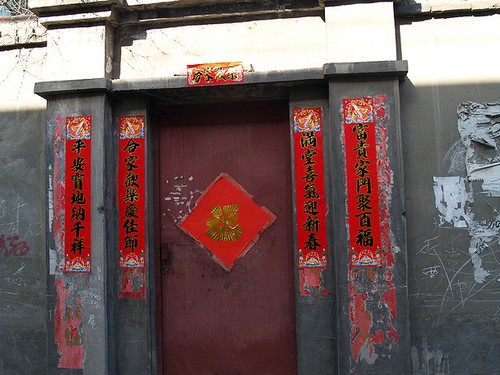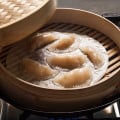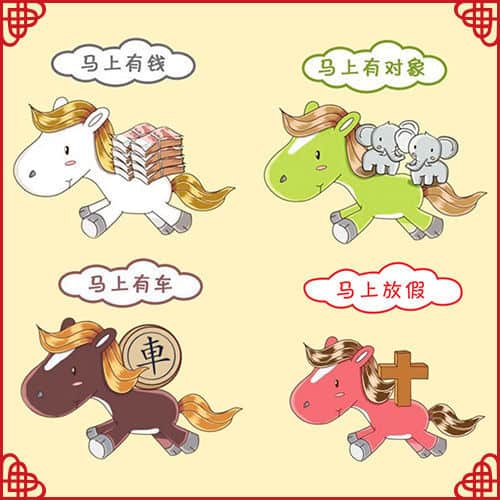When it comes to New Year celebrations in China, it’s not the 1st of January that counts. It’s the beginning of the new lunar year that matters. The Chinese New Year is also known as 春节 (chūnjié, literally Spring festival). Curious to learn more about this Chinese New Year? Here’s a crash course in celebrating New year’s Chinese Style.
Celebrating the new year in China has a lot to do with scaring away the evil spirits, bringing yourself and your family good luck prosperity, and making sure the new year is off to a good beginning. And partying for 15 straight days, until 元宵 (yuánxiāo), the Lantern Festival, puts an end to the festivities. So, ready to learn how to celebrate?
Eat dumplings and fish with your family
Celebrate with your family
春节 is mainly a family event, where everyone gathers together to drink, eat, talk and have fun. The Chinese New Year is of particular significance for people working hundreds or thousands of miles away from home because they can return to their families for a reunion. This period is known as the world’s largest annual migration (read: The Chinese New year is NOT the time you want to be planning on taking the train, a bus, or a plane in China.)
过 : guò = celebrate
过春节 : guò chūnjié = celebrate the New Year.
回父母家: huí fùmǔ jiā = to go home to your parents.
和家人一起吃饺子和鱼: hé jiārén yīqǐ chī jiǎozi hé yú = eat fish and dumplings with your family
和家人一起过春节: hé jiārén yīqǐ guò chūnjié = celebrate Chūnjié with your family
Make dumplings
The making of 饺子, “Jiǎozis,” or dumplings, is a traditional family event on the day before the Chinese New Year (that would be the 9th of February 2013 this year), especially in the Northern part of China. The whole family gathers to make (or wrap – 包: bāo) dumplings and then eat them. It sounds like fun! Some believe they are packing in luck for the coming year by making dumplings. Ancient Chinese coins used to be hidden in the dumplings, also for prosperity. We’ll soon be sharing our own dumpling wrapping secrets and recipes :).
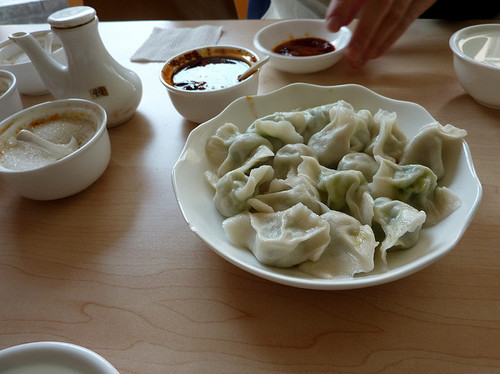
Prepare for some serious dumpling-making sessions! credit: kattebelletje via photopin
除夕: chúxī = New year’s eve
春节的前一天 = Chūnjié de qián yītiān = New year’s eve
饺子: jiǎozi = dumplings
包饺子: bāo jiǎozi = to make dumplings
吃饺子: chī jiǎozi = to eat dumplings
For example: 春节的前一天,我们会包饺子.
Chūnjié de qián yītiān, wǒmen huì bāo jiǎozi.
On New Year’s Eve, we make dumplings.
Eat fish
Fish is another essential dish for 春节, again for purely symbolic reasons. In Chinese, fish (鱼) is pronounced yú, which sounds like this character: 余, (also pronounced yú). 余 means “remains,” surplus or abundance.” So by eating fish (and some say, leaving a few leftovers), you are hoping for a prosperous year! The tradition is to eat a salad, called 捞鱼生 (lāoyúshēng), composed of raw fish and crunchy vegetables. You toss this salad to symbolize luck and prosperity, so the higher you toss the salad and the louder you shout out the name of the salad, the more chance you’ll get in the coming year.
鱼: yú = fish
余: yú = remain; surplus
年年有余 : nián nián yǒu yú = May there be abundance year after year!
Watch ’em toss that salad!
Wish good tidings
Here are a few key phrases to wish a happy new year to your family, friends, and acquaintances once midnight strikes!
过年吉祥话: guò nián jí xiáng huà = New Year wishes
拜年: bàinián = pay a New Year’s call
初一: chūyī = 新年的第一天 = New year’s day
To wish someone something in Chinese, start by saying : 祝你 : zhù nǐ = I wish you or 祝大家: zhù dàjiā = I wish you all.
Newbie
新年好!: xīnnián hǎo!
新年快乐!: xīnnián kuàilè!
Both mean Happy New Year!
Level up!
Good Health
身体健康! : shēntǐ jiànkāng = May you be healthy!
Good fortune
万事如意 : wànshì rúyì
Character breakdown万: wàn = 10 000. It has also come to mean “everything”,+ 事:shì = thing + 如:rú = if + 意: yì = wish == all the best!
For example 祝你在新的一年里万事如意
Zhù nǐ zàixīn de yìnián lǐ wànshì rúyì!
I wish you all the best for this new year!
Prosperity
财源广进 : cáiyuán guǎngjìn = We wish you abundant wealth.
This sentence is similar to 年年有余.
Do
Wear new clothes
In China, you buy and wear new clothes for the New Year. More generally, the idea is to make sure everything is ready to usher in the new year: houses are cleaned, hair is cut, debts repaid, new clothes acquired… so you can start the new year with a clean slate. Regarding the dresses, red-colored ones are favored. That’s because, in ancient times, the Chinese believed that red could scare away evil spirits and bad fortunes. Also, red symbolizes good luck and sounds like success.
Any excuse to buy new clothes is a good one. I like this tradition!
Decorate doors and windows
Doors are decorated with vertical scrolls of characters on red paper. Each household will write Chinese characters seeking good luck and praising nature. This practice stems from old traditions to keep away ghosts and evil spirits. 春联 (chūnlián) is the Chinese name for these vertical scrolls, also called couplets.
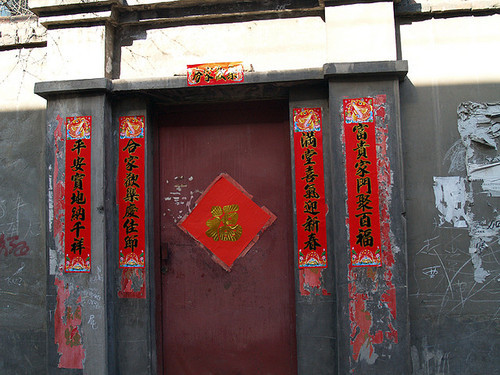
The tradition is to frame the door with these scrolls and stick a big “福” (fú = good fortune) sign in the middle. photo credit: kuber
Delicate and intricate red paper cutouts are also stuck on windows. These paper cutouts are called 窗花 (chuāng huā).
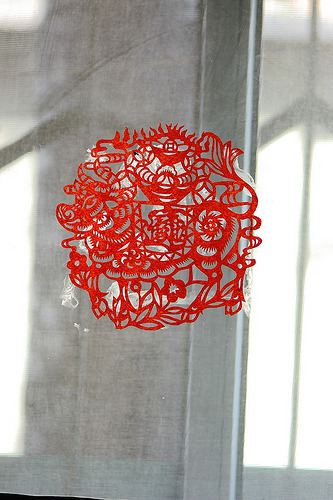
A New Year family activity is also making paper cutouts by hand. Kudos to them if they can make ones that look as good as these! credit: West Zest
贴: tiē = to stick
贴春联: tiē chūnlián = to stick vertical scrolls
贴窗花: tiē chuāng huā = to stick paper cutouts
Make some noise!
Firecrackers are a big celebratory thing in China, used for weddings, festivities, and of course, the Chinese New Year. Firecrackers (called 鞭炮 – biānpào – in Chinese) are usually strung together to make more noise, as the noise was thought to scare away evil spirits. The first time I heard firecrackers in China, I honestly felt a riot was happening outside. Silly me. On New Year’s eve, everybody goes out to lit firecrackers and celebrate the beginning of the new year. So get ready to hear severe firecracker blasts once midnight strikes!
放鞭炮: fàng biānpào = to light firecrackers
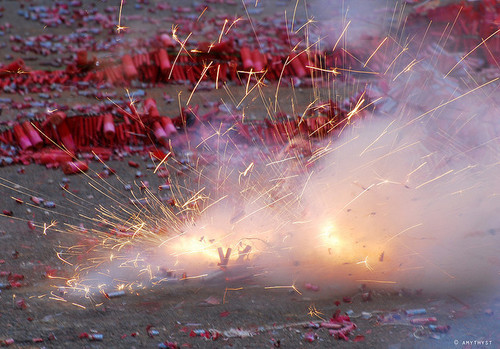
Newcomers to China can easily mistake these firecrackers for something else because of the level of noise they create! photo credit: amythyst_lake
Give New Year gifts
红包, hóngbāo, or red envelopes, which contain money, are traditionally given during the Chinese New Year. They mean lucky money. It is customary for married couples and older folks to give these envelopes to the young ones, ranging from children… to unmarried people. Bosses also sometimes give those to their employees. Small gifts (food and such) are also exchanged between friends or neighbors. Oranges and citrus fruit are trendy gifts.
Watch the New Year TV Gala
In China, everybody gathers to watch the annual Chinese New year TV Gala during the evening. The show is called 春节晚会 (chūnjié wǎnhuì) and is meant to showcase traditional customs. It’s a family program, so expect a bit of everything: music, acrobatics, acts… Although, I’ve heard it’s becoming increasingly cheesy. Guess that’s a trend in television everywhere…
You can check out former shows on your favorite video player, listen to a compilation of the songs played on the show here, and see this year’s lineup here. (In China, it shows on CCTV-1)
Sing the New Year Song
There’s a popular children’s song you can sing for the New Year holiday, called 新年好呀 (Xīn Nián Hǎo Ya!), which you now know means Happy New Year (literally “New Year’s Good, Ya!”). As you’ll hear in the video, the melody is similar to the song “Oh My Darling, Clementine.”
Chorus:
新年好呀! 新年好呀! Xīnnián hǎo ya! x2 Happy New Year!x2
祝贺大家新年好! Zhùhè dàjiā xīnnián hǎo! Happy New Year to you all!
我们唱歌,我们跳舞 Wǒmen chànggē, wǒmen tiàowǔ. We are singing; we are dancing.
祝贺大家新年好! Zhùhè dàjiā xīnnián hǎo! Happy New Year to you all!
So, how are you planning to celebrate the Chinese New Year?
We’ll be making our own 饺子 of course, and we’ll going to our local Chinese restaurant to enjoy a ten course Chinese New Year Feast 🙂 Yum!
Happy Chinese New Year! 新年快乐!
And one more thing…
If you want to continue learning Chinese with authentic and entertaining content, then you’ll love Ninchanese.
With Ninchanese, you get a complete method to learn Chinese which has you speaking, reading, writing, and more in Chinese. What’s more, whether you’re a beginner or an advanced learner, there’s content your level on Ninchanese and plenty more!
Start using Ninchanese on the web, with your computer or tablet, or, for Chinese learning in your pocket and on the go, download the Ninchanese app from the Google Play Store.
The Nincha Team
Stay in touch with us on Facebook, Twitter, Instagram, and Pinterest.
Try the best way to learn Chinese today.
Ninchanese is free to use!
Sign up now
________________________
Credit for title picture: Gw.Wang

